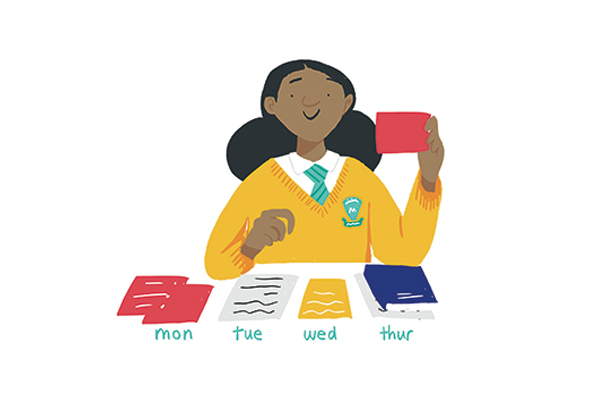When you’re a parent, almost as soon as you get used to your child’s needs – they change. With babies it’s all about stopping them from putting inedible objects in their mouth, or crawling somewhere dangerous… Then as soon as they become less at risk in those areas, they find new and exciting ways to make you worry instead.
Secondary school is a time when teens’ independence accelerates like never before. You’re torn between wanting them to grow up, and wanting to keep them protected. When it comes to their studies, there’s only one way they can be truly successful, and that’s by becoming more independent. Whether your child’s putting off responsibility, or charging ahead faster than you can say “drivers licence”, the best way to help them as they take on new educational challenges is by encouraging and supporting their independence.
So, how can you take off the stabilisers without them falling over? Here are 4 key ways for parents of teens to help their teen develop independence in their studies:
-
Help them find a structure that works for them
-
Be a sounding board for ideas
-
Let them make mistakes
-
Point them in the direction of people who can help
1. Help them find a structure that works for them


As a teen’s workload increases, having a routine is more important than ever. Rather than saying to them “you’ll study this subject at this time” though, try being more of a guide, pointing them in the right direction rather than taking them to the destination.
Encourage them to make their own weekly planner, with room for all their subjects each week, as well as extra-curricular activities and time with their friends. In the process of making it, they’ll have to ask themselves questions like “how long will I need for this sort of task?” and “will I have time to get home in time to complete this on that day?”. It’s through this process of self-questioning that they can become aware of how they study, and be much more likely to follow through with a plan they’ve made for themselves, rather than one that’s been given to them.
2. Be a sounding board for their ideas


Whatever stage your teen is at, they’ll be asked at certain points of the school year to think about what they’d like to do in the future. Whether that’s what A Levels (or equivalent) to pick, what to study at university or college, and even what they’d like to do for a career later on. Rather than encouraging them in a specific direction, they’ll be more likely to find a path that’s truly right for them if they discover it themselves. Where you can be hugely helpful in their process of decision-making is by acting as a sounding board for their ideas – and asking the right questions.
If, for example, your teen comes home one day saying they’d like to be a racecar driver, rather than saying ‘I don’t think that’s a suitable career idea”, asking them “How do you become a racecar driver?”, “What is it about this that makes you want to do it?”, “How long is the average career of a racecar driver?”, you make them think through the practicalities of how they can make their dream a reality – and reflect on whether it’s the right move for them.
3. Let them make mistakes


As much as you want to help your child do well every day, often it’s only with a bit of failure that kids learn. If, for example, they have a test the next day, leave it until the last minute to cram and then don’t get their best score, that’s a nice real consequence for not getting organised. It’s still helpful for you to ask them what challenges they’ve got coming their way, as this can help them remember to study. Ultimately though, as all adults know, sometimes the best way to learn is the hard way.
4. Point them in the direction of people who can help


If school closures taught parents anything, it’s that they don’t have all the answers (especially when it comes to quadratic equations). Even when you do know some of the answers, teens – for some strange reason – often don’t like being taught by their parents. But even if you don’t know the UCAS process back to front, or the assessment objectives for A Level History, you can help your teen a lot by pointing them in the direction of people who do. For careers-related things, every school has a Careers Advisor whose job it is to help teens work out their career options. For advice from a school careers advisor on how to help your teen plan their career, check out our previous blog.
For their homework and exam prep, their teachers might be able to give them some extra help after class or after school. At MyTutor, we’ve got top quality online tutors who can help with all the above. They’re all from UK universities and just a few years ahead in their education too, which means they double as role models and mentors who teens feel comfortable sharing their worries with. Then you can get on with all the other parts of parenting – love, hugs and chauffeuring.
If you’d like a hand finding a tutor for your child, give our Tutor Experts a call and they’ll help you find exactly what you need – from subjects, right down to exam boards, hobbies and personality fit.




